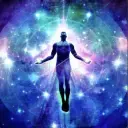For me it is Cellular Automata, and more precisely the Game of Life.
Imagine a giant Excel spreadsheet where the cells are randomly chosen to be either “alive” or “dead”. Each cell then follows a handful of simple rules.
For example, if a cell is “alive” but has less than 2 “alive” neighbors it “dies” by under-population. If the cell is “alive” and has more than three “alive” neighbors it “dies” from over-population, etc.
Then you sit back and just watch things play out. It turns out that these basic rules at the individual level lead to incredibly complex behaviors at the community level when you zoom out.
It kinda, sorta, maybe resembles… life.
There is colonization, reproduction, evolution, and sometimes even space flight!


The incessant idea that I get when I read about quantum physics: with no observers and nothing to interact with/measure it, was the universe itself in superposition during the Big Bang? If so, did the wave function even collapse or are we just one of the possible outcomes inside of it?
An observer is not required for something to exist. You are misunderstanding. In quantum physics observers affect the thing they observe. That’s it.
Never said anything about it not existing. From what I understood, a particle that’s not interacting with an outside force stays in superposition by default. The universe was supposedly a single particle at the moment of the Big Bang, thus it stands to reason that it would have been in superposition if it couldn’t interact with anything else.
If you trace back the cosmological evolution of our universe you’d get a “singularity”, that is not the same thing as being a single particle. Even the physical existence of a singular point at the beginning is not accurate. A singularity in physics is a mathematical artefact signaling the breakdown of the descriptive power of the theory you are using. The common example is the singular behaviour of the electric field around a charged particle in classical electrodynamics, the singularity is a signal that you’d need to switch to quantum electrodynamics to describe the physics close to a charged particle. Similarly with cosmology: close to the beginning we have a singularity that signals the breakdown of the descriptive power of our theories, and we need to switch. What we would switch to we call a " quantum gravity theory", but we are not yet sure what that theory is.
I see what you mean, but if this is possible, then I don’t see why not the entire universe as a whole near T≈0.
If you don’t see why it’s impossible, then you don’t understand it. You can’t just lump together all the “quantum” ideas because they sound cool.
Notice that the particles in your article were “super-chilled”. That’s the exact opposite of the early universe.
So you’re saying it’s absolutely, 100% impossible that the universe in its entirety was/is in superposition at any one point?
We are in a simulation 😉
If you are asking the question, wouldn’t you be observing it, therefore the wave function most certainly did collapse?
I’m hearing the echo of Descartes in there. I think, therefore I am.
EDIT: “I ask, therefore I have observed, therefore the Universe is”.
That’s the wrong interpretation of “observing”. Observation is the act of measuring the properties of an object/particle by “interacting” with it. Basically if something is not being observed (I.e completely isolated) it enters superposition until such a time that it’s measured/interacted with again. Observation has nothing to do with consciousness imo, just connection to causality in the universe at large.